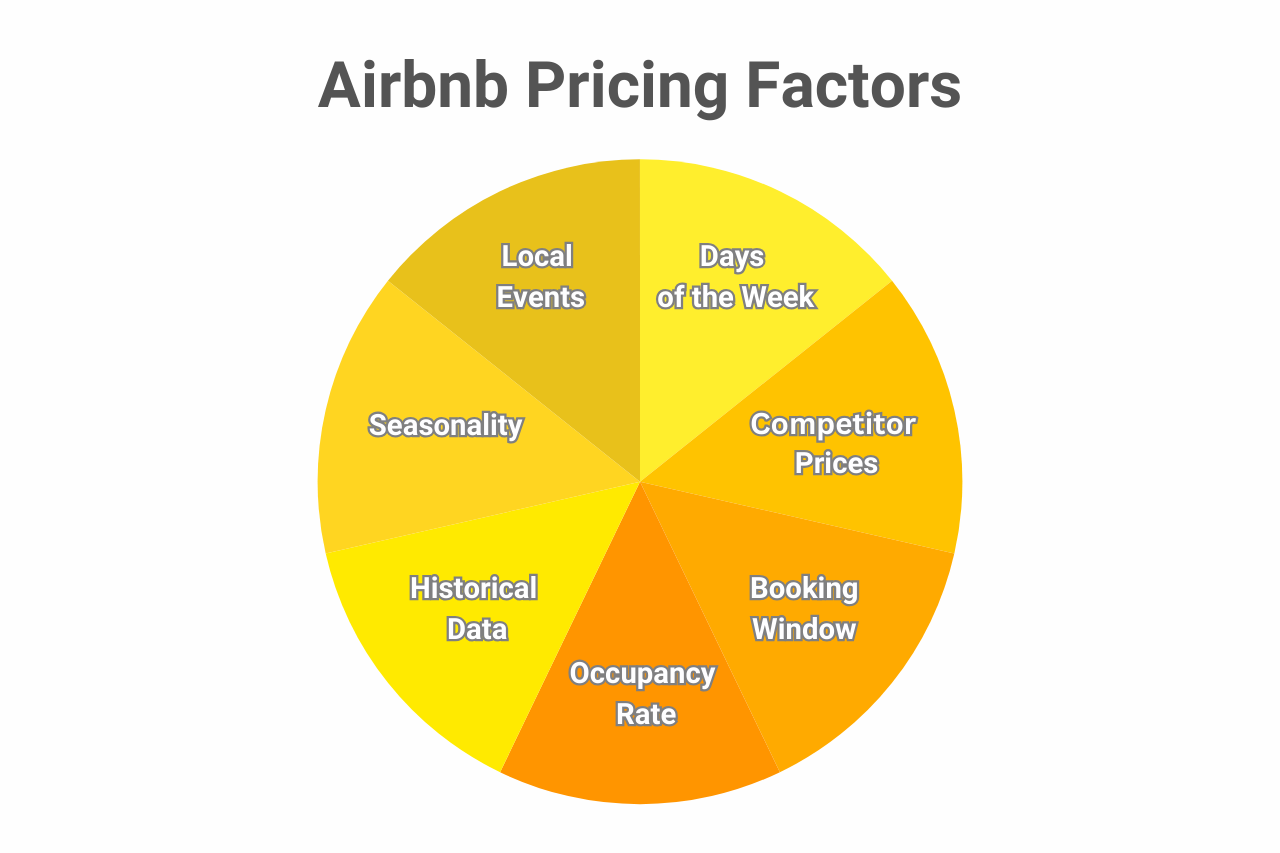Best Airbnb Pricing Tool in 2024: Side-by-side Comparison

Ever wondered how much of a difference dynamic pricing tools can make? Imagine it’s high season, like August. The average nightly rate in your area is $160, but with the right pricing strategy, you could be charging a cool $250+ or even $350+ per night – without offering extra or premium amenities (nothing beyond what your competitors provide). That’s a realistic scenario when you combine high demand with a smart pricing strategy.
One of the tools from our list, PriceLabs, mentions in a case study how their client saw a 35% increase in their average booking value after using their tool. This isn’t an outlier, as all the best pricing tools can bring you between a 15-40% boost in income on average.
Keep reading to see how these solutions stack up against each other and find the perfect dynamic pricing tool for your needs.
Let’s dive in!

What Is the Best Pricing Strategy for Airbnb?
The best pricing strategy for Airbnb is a dynamic pricing approach. This means your nightly pricing adjusts based on various factors, primarily supply and demand in your market. Hotels have utilized dynamic pricing effectively for years, and it’s equally effective for vacation rentals.
Mastering Airbnb pricing is both science and art. Pricing experts emphasize that customer perception of value determines prices more than the actual cost of the product.
So, what influences your Airbnb pricing and what do guests value the most? Does their perception of Airbnb listings change over time? How do guests decide to book your listing in the first place?
Factors Influencing Airbnb Prices
Several key factors significantly impact your Airbnb pricing:
- Property Type: Whether it’s a cozy cabin, an exotic glamping site, or a sleek city condo.
- Location: It’s always been a major pricing factor determining market demand, so pick location wisely.
While these factors are relatively fixed, other variables can also affect your pricing:
- Seasonality: Tourist influx varies by location and time of year. Expect higher prices during peak seasons.
- Weekends vs. Weekdays: Weekends generally see higher demand, allowing for price adjustments.
- Events: Local events, special events and holidays can present opportunities for increased pricing.
- Length of Stay Discounts: Offer discounts to incentivize longer bookings.
- Booking Window: Last-minute bookings compared to booking months in advance.
Airbnb pricing tools consider all these factors and more to suggest optimal rates.

Clearly, the perceived value of your property varies depending on whether it’s high, mid, or low season. It also differs between weekdays and weekends, with the latter often being prime time for romantic getaways. Similarly, guests booking last minute tend to be less picky than those planning a trip far in advance.
Airbnb allows plenty of customization options. Property managers can adjust minimum stays, set discounts, and even create custom pricing rules.
However, for a truly comprehensive approach, consider using a dynamic pricing tool. The best Airbnb pricing tools can handle the heavy lifting of market analysis and constant monitoring of the market, occupancy rates, and nightly rates of your competitors. If you have big plans to scale your business, you’ll find it challenging to succeed without smart pricing tools and property management systems.
This brings us to the next question:
How to Automate Airbnb Pricing Using a Dynamic Pricing Tool?
You need a machine learning tool that can analyze large chunks of market data. This type of software is known as dynamic pricing software or an Airbnb pricing tool. These tools analyze both current market data and historical trends to recommend the best prices for your property type based on current supply and demand dynamics.
Pricing tools pull data from booking platforms and usually integrate with them: Airbnb, VRBO, Homeaway, Tripadvisor, and Booking.com. They also integrate with rental property management software such as iGMS.
Key Benefits of Using Airbnb Pricing Tools
How does a guest decide to book a listing? On OTA platforms like Airbnb, guests will likely compare your property with similar listings in the area. They’ll go back and forth between listings, comparing them in their minds to reach a decision based on overall impression. Pricing plays a major role in this process.
Let’s look at an example:
Host A overprices its listing, putting off most people with its high cost. Guests won’t shell out for the most expensive accommodation without a good reason, especially during the mid and low seasons.
Host B underprices its listing. While this is good for occupancy rates, it’s not great for revenue. Better-paying guests often associate a lower price with lower value.
Host C uses a dynamic pricing tool, showing up in front of guests with the most attractive price tag and hitting the sweet spot between value and expectations.
In other words…
- Pricing tools give you a competitive edge by continuously analyzing local market conditions, demand patterns, and competitor pricing. They help you stay ahead of the competition by ensuring your prices are attractive to potential guests and your property still profitable.
- Secondly, this dynamic pricing strategy helps you capitalize on every opportunity to boost your earnings without constant manual intervention; the dynamic pricing tool makes automatic adjustments. For those worried about giving pricing power to a third-party tool, keep in mind that parameters are adjustable. It’s even recommended to evaluate results and update your smart pricing strategy from time to time.
- It’s a time-saver. Manually adjusting prices on the Airbnb platform requires continuous market analysis and frequent pricing updates, which is both time-consuming and prone to errors. Those who want to scale their business will likely opt for one of the best pricing tools we’re about to break down.
- Each Airbnb pricing tool includes performance tracking, enabling property managers to adjust their smart rates accordingly.
So, what’s the best Airbnb pricing tool for Airbnb hosts?
Side-by-side Comparison: What is the Best Airbnb Pricing Tool?
| Airbnb Smart Pricing Tool | Wheelhouse | Beyond | PriceLabs | DPGO | |
| Pricing Model | Free | 1% revenue per booking or $19.99/listing/month | 1% per booking | Starts at $19.99/listing/month | $18/listing/month or $0.5 of booked price, or Fixed plan $1 per booked night |
| Free Trial | / | Yes | No | Yes | Yes |
| Market Coverage | Anywhere in the world where Airbnb is present | 1,500+ markets in 100+ countries; some regions and counties are not covered | Global; some regions and countries are not covered | Practically anywhere in the world, 135+ countries | Canada, US, Australia, Mexico |
| Best Features | Free built-in Airbnb tool to increase bookings on Airbnb | Competitive dynamic pricing, easy-to-use interface | Dynamic pricing backed by extensive data analysis, easy performance tracking | Robust pricing customization, market intelligence, suitable for large portfolios | Customization options and adjustable pricing strategies |
Let’s check out the most popular Airbnb pricing tools.
Airbnb Smart Pricing Tool
Airbnb has created its own smart pricing tool within the platform to help hosts increase reservations and boost the company’s profits. The best part is that Airbnb Smart Pricing is completely free to use.
You can simply toggle a switch to turn it on on your Airbnb dashboard and give it a try. Reviews are mixed; some Airbnb hosts report great results, while others are less satisfied with the profits they make using Airbnb Smart Pricing. Even though you can set a minimum price, this tool doesn’t necessarily provide the highest possible rate per night.
If your goal is to get more bookings, it’s worth trying out the Airbnb pricing tool. However, if you want to level up your Airbnb pricing strategy and optimize your property to bring in higher revenue, you likely won’t be able to rely solely on flipping this switch. You may need a more comprehensive approach to pricing.
Best Features
- Built-in Airbnb’s smart pricing tool.
- Completely free to use to automate pricing.
- Utilizes first-party data: local demand, number of views your listings receive, reviews and ratings, and occupancy rate in the area.
- Allows you to set minimum and maximum prices, giving you some control over pricing strategies.
- Can be easily turned on or off
- Uses real-time market data.
Cons
- Focused on overall Airbnb profitability rather than maximizing earnings for individual hosts.
- Exclusive to Airbnb.
- Will not pull prices into property management systems.
Wheelhouse
Wheelhouse is a user-friendly Airbnb pricing tool that has quickly gained popularity among hosts, property managers, and vacation rental business owners. It can help your listings appear more competitive in searches on Airbnb and other platforms.
The tool features an intuitive interface and allows users to customize rules, add custom nightly rates for any date range, or apply specific pricing strategies for particular days.
In addition to giving you great control over your smart rates, Wheelhouse provides reports so you can track revenue, occupancy, and other key performance indicators (KPIs) you want to monitor, allowing you to make informed adjustments.
With this tool, you can conduct A/B tests to determine the optimal price, minimum stay, or ideal cancellation policy for your listing.
Right from the start, Airbnb hosts can choose between Recommended, More Aggressive, and More Conservative rate strategies, which they can fine-tune later.
Wheelhouse offers two pricing plans: a fee-based pricing structure that charges 1% of revenue per booking, or a flat-rate plan that costs $19.99 per listing per month (with volume discounts available).
Best Features
- User-friendly interface
- Seamless integration with other tools like booking platforms (direct or via API) and property management systems.
- Comprehensive market trend analysis and competitor rates insights.
- Global reach: available in over 1,500 markets across 100+ countries.
- Customize pricing and rules for specific date ranges and price locking feature for selected periods.
- Flexible pricing boundaries with min and max price settings.
- Automatic pricing adjustments for holidays, weekends, and special events.
- Robust performance tracking and goal monitoring tools.
- A/B testing capabilities for optimizing pricing strategies.
Cons
- Some users would appreciate more detailed performance statistics.
- No direct integration with VRBO or Booking,com, but integration via their API is possible. When used with iGMS, Wheelhouse pricing recommendations will be pushed to all channels.
- Coverage is limited in Asia, Africa, and South America.

Beyond
This popular dynamic pricing tool, formerly known as Beyond Pricing, offers extensive dynamic pricing capabilities based on large datasets and data points from listings across the globe. They claim to increase revenue per available night by an average of 35%.
Beyond integrates directly with Airbnb, VRBO, Booking.com, and other channels, as well as property management software (PMS) such as iGMS. This pricing tool allows an Airbnb host to predict market trends and create competitive daily rates up to 12 months in advance.
For each property, Beyond assigns a health score metric that evaluates performance and highlights room for improvement. Market insights and reports help you explore key metrics such as booking lead time, booking activity, length of stay, average daily rate (ADR), historical data and more.
Beyond uses a percentage-based fee pricing structure, taking 1% on each booking. They don’t offer a monthly subscription plan.
Best Features
- Bulk Actions for efficient updating of prices and discounts across all listings.
- Customizable base price and minimum stay requirements.
- Override suggested rates and adjust manually needed.
- Property health scoring on a 1-100 scale to identify areas for improvement.
- Flexible pricing rules to fit your strategy.
- Comprehensive market insights, including: Trend analysis, key metrics tracking (e.g., booking lead time, length of stay), competitor analysis, and revenue management.
- Automated last-minute and orphan day discounts as gap-filling strategies.
- Integration with multiple channels (Airbnb, VRBO, and more) and property management systems.
Cons
- More expensive fee structure.
- Some users report an overpricing tendency, although it can turn out to be a positive thing for users.
- Not available in all countries around the world; check your geographical location on their map.

PriceLabs
PriceLabs, the next Airbnb pricing tool on our list, is used by over 300,000 properties worldwide. What sets PriceLabs apart is its ability to be used effectively almost anywhere, even in locations with limited market data. They operate in more than 135 countries globally.
This robust software offers full customization options, but its complexity means users might need some time to learn how to use it to its full capacity. The Pricelabs dynamic pricing algorithm detects seasonality, day-of-week variations, events, holidays, and lead time, while analyzing current occupancy and Average Daily Rate (ADR).
With PriceLabs, you get access to insights like monthly and annual revenue estimates and average daily rate estimates for any location, as this tool excels at market intelligence. While its insights may not be as in-depth as those from specialized market research tools like AirDNA, it’s still very useful to hosts.
PriceLabs charges a flat monthly rate based on the number of units, starting at $19.99 per property per month. However, they offer volume discounts, making this tool suitable for large portfolios.
Best Features
- Robust dynamic pricing features.
- Global reach, used in any location worldwide.
- Extensive customization options (base, minimum and maximum price, length of stay, date-specific overrides, etc.).
- Minimum length of stay recommendations, last-minute discounts, and far-out premium adjustments.
- Extensive reporting capabilities on listing-level performance and key metrics revenue management.
- Pricing recommendations and rate monitoring.
- Integration with 100+ booking channels and other software.
- Market Insights with monthly and annual revenue estimates, ADR, demand, and seasonality trends for any location.
Cons
- The steep learning curve for navigating robust features and functionalities.
- Less cost-effective for small-scale users.

DPGO
Another dynamic pricing software worth considering is DPGO. Though a young company founded in 2019, they’ve set high standards in reaching and surpassing established competitors. The software uses AI-driven deep learning that takes into account over 200 market parameters to generate effective pricing.
DPGO seamlessly integrates with Airbnb and property management software, including iGMS.
They base their price recommendations on factors such as reviews, local booking trends, competitor occupancy rates, seasonal fluctuations, historical booking rates, local events, days of the week, length of stay, cancellation policy, and even proximity to vital services.
DPGO offers multiple pricing options: a flat monthly fee starting at $18 per month, a Flexible tier charging $0.5 of the booked price, and a Fixed plan charging $1 per booked night.
Best Features
- AI-driven Airbnb smart pricing software analyzes over 200 data parameters.
- Base price determines your overall strategy.
- Ability to set pricing rules, including minimum and maximum prices, discounts, time-based rules, and date-specific rules.
- Four approaches for weekend pricing: Recommended, Aggressive, Conservative, and Custom.
- Tracks the growth performance of your listing.
- Assigning a health score from 1 to 10 to your property for a better understanding of its performance.
- Provides pricing predictions 52 weeks in advance.
Cons
- DPGO currently only covers markets in Canada, the US, Australia, and Mexico.
- As a younger company compared to others on this list, it has fewer public reviews.
Integrations with iGMS
When using iGMS as your rental property management software, you can directly integrate iGMS with any Airbnb pricing tool listed in this article. If you need support with your daily operations when managing vacation rentals, iGMS can assist you with:
- Automated Guest Communication: Simplifies check-in/check-out processes and guest interactions.
- Task Management: Streamlines cleaning and maintenance tasks, ensuring the property remains in top condition.
- Channel Management: Manages bookings across multiple platforms, maximizing occupancy rates.







![Your Monthly iGMS Roundup [February 2020]](/content/images/size/w600/wordpress/2020/02/igms-roundup-feb-2020-cover.png)

